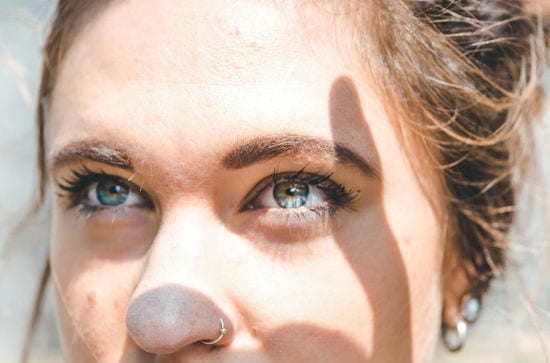Have you ever noticed a strange smell coming from your nose ring and wondered what’s causing it? You’re not alone. This common issue can be both annoying and embarrassing, but understanding the reasons behind it is the first step to solving the problem.
In this blog, we delve into the common culprits that make you exclaim “Why does my nose ring smell” in frustration. We will also provide detailed guidance on how to properly clean and maintain your nose ring to ensure it stays fresh and odor-free. Join us as we explore practical solutions to keep your nose jewelry pristine!

So why does my nose ring stink? In fact, the unpleasant smell from a nose ring often boils down to a few common issues: bacteria accumulation, debris buildup, and inadequate cleaning routines. Here’s a closer look at each factor of why do nose rings smell:
When you cry out in vexation “Why does my nose ring smell like cheese”, it could be due to a buildup of bacteria. Your nose is a natural habitat for bacteria, which can thrive on the skin and inside the piercing hole. When these bacteria mix with sweat and oils from your skin, they can produce a foul odor, emphasizing the need for regular cleaning.
Debris such as dead skin cells, dust, makeup, and other external pollutants can get trapped around the nose ring and piercing area. This buildup not only causes smell but can also lead to infections if not cleaned regularly.
Neglecting proper hygiene practices is one of the major contributors to why does my nose ring smell like fish. Regular and thorough cleaning is necessary to remove the bacteria and debris that lead to bad odors. Using appropriate cleaning solutions and techniques is crucial to maintaining the health of your piercing and preventing unwanted smells.
Keeping your nose ring clean is essential not only for preventing odors but also for ensuring the health and longevity of your piercing. Here’s a step-by-step guide on how to properly clean your nose ring:
Always start by washing your hands thoroughly with soap and warm water before touching your nose ring or piercing. This prevents the transfer of bacteria or dirt to the piercing site, reducing the risk of infection.
A sterile saline solution is the best option for cleaning your nose ring and piercing. You can buy a ready-made saline solution or create one yourself by dissolving 1/4 teaspoon of non-iodized salt into 8 ounces of warm distilled water. It’s important to steer clear of strong chemicals such as alcohol, hydrogen peroxide, or antibacterial soaps, as they can cause irritation to the piercing.
Soak a clean cotton ball or gauze pad in the saline solution and gently press it against the piercing for a few minutes. This helps to loosen any crusted debris and soothes the area. Alternatively, you can dip your nose into a small bowl of the saline solution if your piercing is more sensitive.
Using a clean cotton swab or pad, gently clean around the piercing to remove any debris or dried skin. Be careful not to rotate or move the jewelry unnecessarily, as this can irritate the piercing and prolong healing.
After cleaning, rinse the area with warm water to remove any remaining saline solution. Gently pat the area dry with a clean paper towel or let it air dry. Avoid using cloth towels, as they may harbor bacteria.
Preventing your nose ring from developing an unpleasant odor is as crucial as cleaning it. Here are several proactive measures you can take to ensure your nose ring remains fresh and odor-free:
Regular Cleaning Schedule: Establish a routine cleaning schedule for your nose ring. Cleaning it daily or every other day with a saline solution can prevent the buildup of bacteria and debris.
Choose Appropriate Jewelry Material: Opt for high-quality materials like surgical stainless steel, titanium, or gold. These materials are less likely to react with your skin or harbor bacteria compared to cheaper metals.
Avoid Touching the Piercing: Minimize touching the nose ring and the area around it with your hands, unless you are cleaning it. Our hands often carry germs that can transfer to the piercing site and contribute to odors.
Keep the Area Dry: Moisture can exacerbate the growth of bacteria. After cleaning or showering, make sure to dry the area around your nose ring thoroughly with a clean, disposable paper towel or allow it to air dry.
Use Non-Irritating Products: Be cautious about the facial products you use, such as creams, makeup, or sprays, near the piercing area. Opt for non-comedogenic and fragrance-free products to reduce the risk of irritation and bacterial buildup.
If routine cleaning doesn’t resolve the odor from your nose ring, or if you notice symptoms that indicate an infection, it’s time to seek professional help.
Signs that warrant a visit to a professional include persistent redness, swelling, pain, discharge, or a foul odor that doesn’t go away with regular cleaning. A professional piercer or a healthcare provider can assess the situation and determine if there’s an infection or an allergic reaction to the jewelry material. They can also provide guidance on proper care and, if necessary, recommend a change in jewelry or prescribe treatment to resolve the issue.

Now you can answer why does my nose ring smell bad. This issue often stems from factors such as inadequate cleaning, bacteria buildup, and debris accumulation. While encountering a smelly nose ring can be bothersome, it's a problem that can usually be managed with proper care. By implementing the cleaning steps and preventive measures outlined earlier, you can effectively maintain the hygiene and freshness of your piercing, ensuring that your nose ring remains a clean and comfortable adornment.
It's best to clean your nose ring at least once a day with saline solution. This frequency can help prevent the buildup of bacteria and debris, which are common causes of odors and potential infections.
A cheesy smell from a nose piercing is often a sign of bacterial presence, particularly from anaerobic bacteria that thrive in low-oxygen environments. This isn’t uncommon but indicates that the cleaning routine needs improvement to better manage bacterial growth.
Nose piercings can be prone to infections if not properly cared for. Factors like touching the piercing with unclean hands, using unsuitable cleaning products, or environmental exposure can increase the risk. Following a strict hygiene regimen and handling the piercing minimally can significantly reduce the chances of infection.